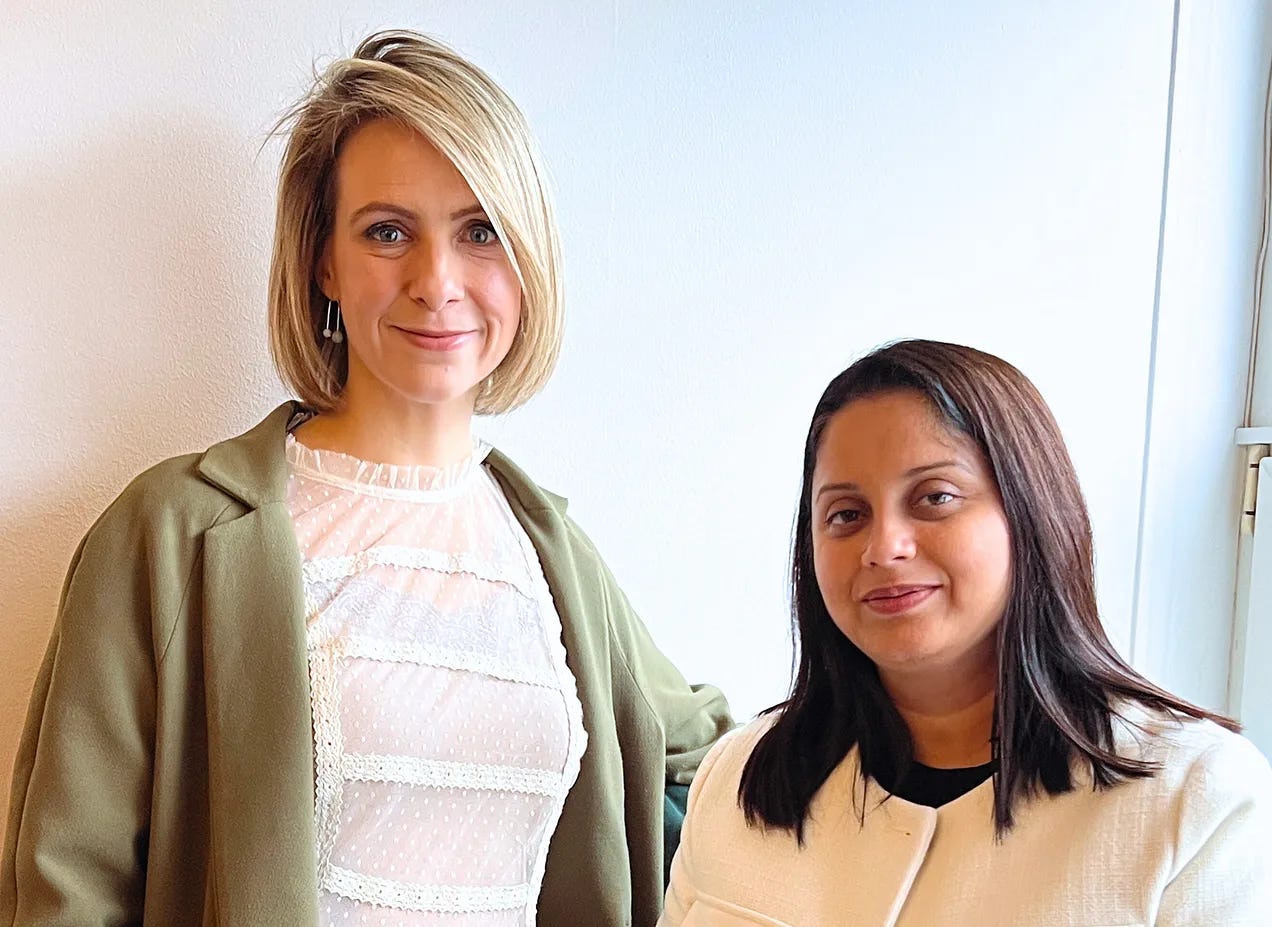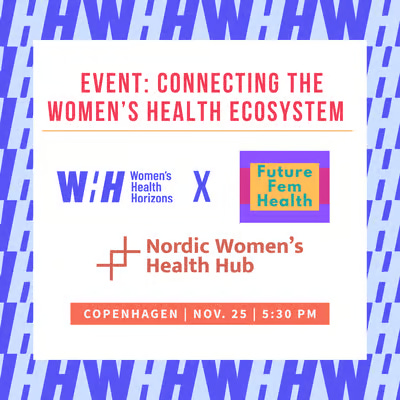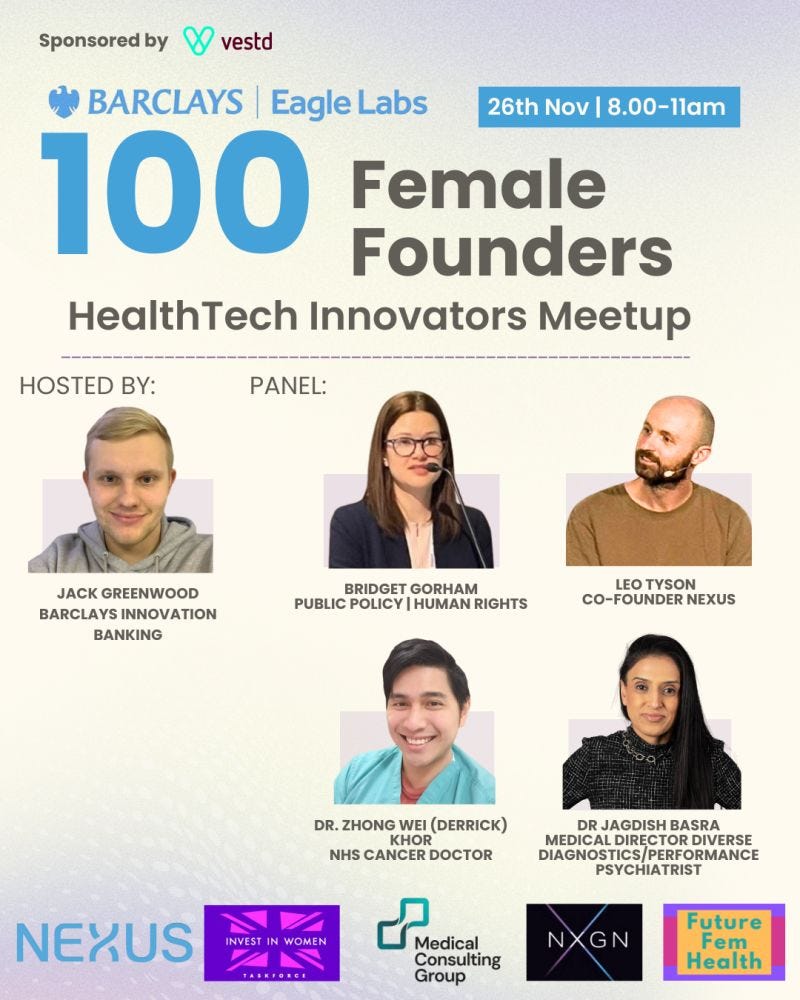💌 Issue 123: $8m for new osteoporosis treatment | smart earring Lumia | Emm's connected menstrual cup | UVISA opens waiting list
The global weekly briefing on women's health innovation and FemTech
Welcome to FutureFemHealth, (w/c November 17, 2025) — the global weekly briefing on women’s health innovation, trusted by 8,700 investors, innovators and leaders to decode the funding flows, breakthrough ideas and policy shifts transforming the sector.
As you read this, I’m en-route to London for a roundtable in Parliament tomorrow on censorship in women’s health. We’re excited to be meeting a number of MPs to spotlight this important issue - plus there’s word that a rep from a social media platform is joining us too. I’ll report back next week!
🌟 In this week’s briefing:
🦴 Skeletalis raises $8m for new osteoporosis treatment
🩸 Emm raises €7.7 million for connected menstrual cup and app
💰 80 nonprofits receive $250m for global women’s health from Melinda Gates
✅ UVISA opens waiting list for light-based device targeting vaginal infections
Got news to share from the world of FemTech and women’s health innovation? Let me know at anna@futurefemhealth.com
💰 Capital flows: where are investors placing bets?
📌 U.S: Skeletalis emerges from stealth with $8m seed round to develop precision medicine for osteoporosis. Post-menopausal women represent 70% of all cases of osteoporosis but osteoporosis treatments have changed little in decades. Current drugs can carry rare but serious side effects that limit adherence, so founder and CEO Ben Swanson said his company aims to deliver more targeted intervention with tissue- and cell-specific precision. This round was led by Pillar VC. (Continue reading: FutureFemHealth)
📌 UK: Emm raises €7.7 million for connected menstrual cup and app. So many women go to the doctors with heavy bleeding but there’s until now there’s not been a way to accurately quantify that. You might remember the launch of Joii earlier in 2025 which is a smart period pad and app to analyse blood volume and clot size. Now Emm is doing the same for the menstrual cup. “We envision a future where menstrual health is measured and understood as comprehensively as cardiovascular or metabolic health, giving people access to objective, actionable insights to better manage their health and wellbeing” says founder and CEO Jenny Button. This seed round was led by Lunar Ventures. (Continue reading: EU-startups)
📌 U.S: Lumia snags $7m to bring real-time blood flow sensing to smart earrings. Many people frequently experience brain fog, lightheadedness, or fatigue without an obvious cause, even when standard vital signs remain within normal ranges. Traditional wearable devices miss a critical piece of the puzzle by failing to measure blood flow to the head. The tech allows uses to wear the Lumia 2 device with a variety of earring styles and it weighs less than 1 gram. This round was led by J2 Ventures, BonAngels Venture Partners and angels. Lumia also secured $5.1m in government contracts and grants. The next phase for the startup is expanded access and further product development. (Continue reading: Tech Funding News)
📌 U.S: Clairity raises $43m to fuel US rollout of AI breast cancer platform. Early detection of breast cancer significantly increases the chances of successful treatment and survival. Clairity Breast is claimed to be the first FDA-authorised platform for predicting a woman’s five-year risk of developing breast cancer via mammogram analysis. This Series B round was led by ACE Global Equity and Sante Ventures. (Continue reading: Medical Device Network)
📌 U.S: FamilyWell Health secures $8M to expand women’s mental health and menopause care nationwide. Women’s mental health is one of healthcare’s most underserved and fastest-growing areas of need. FamilyWell’s virtual model embedded in clinics and health systems has seen 70% of patients achieve clinical remission within four months. Now it will expand its proven perinatal model nationwide and broaden into menopause mental healthcare too. This round was led by New Markets Venture Partners. (Continue reading: Hit Consultant)
📌 SWEDEN/ US: Essity acquires Edgewell’s North America business including brands Carefree, Stayfree and Playtex. Known for existing global brands including TENA, Libresse, Bodyform and Modi Bodi, Essity says this $340m acquisition of a number of household names in the U.S continues its focus on high margin categories and the growth of its market position in the US, “the world’s largest hygiene market” (side note - are we still using language like hygiene for the period product category?!). (Continue reading: Cision)
📌 GLOBAL: More than 80 nonprofits receive $250m for global women’s health from Melinda Gates. An estimated 4,000 organizations from 119 countries applied for these grants which ranged between $1m and $5m. Initiatives include those that train midwives in Mexico and others developing tools to reach women in Brazil. (Continue reading: APNews)
📌 UAE: Nabta Health closes $2m pre-Series A to expand hybrid women’s health model. Founded in 2017 by Sophie Smith, NABTA is a healthcare company dedicated to transforming women’s health in the Middle East through an AI-powered hybrid model that combines digital, at-home and in-clinic care. Nabta will use the new capital to expand across MEA, build new diagnostic and at-home testing pathways, and strengthen clinical infrastructure through hospital partnerships. This round brings total funding to $4.5m. (Continue reading: Wamda)
This week’s poll
I’ve noticed a significant increase in emerging conferences and events focused on FemTech and women’s health. Which got me thinking…
Last week’s poll asked: Has the online censorship and digital suppression of women’s health got worse in 2025? A resounding 69% of you said that yes, it’s definitely getting worse. Just 9% of you felt it was about the same as 2024 and 3% said it has improved.
I also forgot to report back on our testosterone poll from two weeks ago - 53% of you said that you were on the fence when it came to testosterone therapy for women. Just 18% of you are fully supportive of its rollout before more research and 19% of you were unsupportive.
🌟 Industry moves and strategic shifts
📌 DENMARK: UVISA opens waiting list for light-based device targeting vaginal infections. Bacterial vaginosis (BV) and yeast infections are two conditions that affect large numbers of women but are often difficult to treat, particularly when standard antibiotics or antifungals fail. UVISA uses light-therapy to address symptoms and is a drug-free alternative for those with recurring discomfort or irritation. Human testing is now underway ahead of regulatory approval and market launch in the US in 2026, followed by the EU. (Continue reading: FutureFemHealth)
📌 UK: Carea launches Postpartum Mum Tracker as UK mothers face a “silent epidemic” of postnatal mental health struggles. Unlike baby-focused trackers, Carea’s tracking app centres the mother — monitoring C-section incision healing, breast health, sleep, anxiety, overwhelm, bonding difficulties and identity loss. It flags patterns and “signs to watch for”, helping women recognise when they may need support. Founder Anastasia Shubareva-Epshtein created the feature after her own experience with postpartum anxiety, arguing that mothers become “invisible” once the baby arrives. (Continue reading: FutureFemHealth)
📌 U.S: Maven turns its maternity dataset into predictive engine. Maven is rolling out AI features that use its vast maternity dataset to spot risks earlier - from gestational diabetes to preeclampsia - and personalise care. The expanded program aims to reduce c-sections by 15% and NICU hospital stays by 8% thereby reducing costs too and giving employers a clear ROI. (Continue reading: FutureFemHealth)
📌 U.S: Expect unveils GLP-1-era pregnancy fitness and coaching model built around metabolic health. Pregnancy fitness platform Expect is targeting metabolic health before, during and after pregnancy. With gestational diabetes affecting one in ten pregnancies — and half of those women later developing type 2 diabetes — the prevention-focused approach in its new fitness and doula coaching approach seeks to bridge gaps between medical visits and everyday support. By combining movement, coaching and clinical oversight, it reflects a wider shift toward proactive, digitally delivered maternal care in the GLP-1 era. (Continue reading: FutureFemHealth)
📌 U.S: Visby partners with Google Cloud to launch at-home PCR test for STIs in women. STI testing still carries significant barriers such as stigma, access and time. Visby’s palm-sized test detects three of the most common and often asymptomatic infections - chlamydia, gonorrhea, and trichomoniasis - in 30 minutes. Plus, the product is already available for on-demand delivery through DoorDash in 10 major metropolitan areas. (Continue reading: Medical Design and Development)
📌 CANADA: How Cogni Corp+ Therapies is rethinking mental health assessment. There’s little mental health support that’s focused at the preventative end - less still that takes into account all aspects of our wellbeing (for exmaple environmental, physical and financial as well as emotional). With 70% female users, Cogni Corp+ Therapies assesses therapy notes to produce personalized recommendations that users can turn to at-home and between therapy sessions. (Continue reading: FutureFemHealth)
📌 CANADA: How Mino Care is building culturally safe birth support. with partnerships spanning more than 20 clinics in Canada. Mino is proving its model helps to improve maternal health outcomes. While Mino Care does not replace hospitals or clinicians, it operates as a virtual reproductive health centre, linking hospitals, community clinics and midwifery practices to an ecosystem of specialists. Originally launched in 2017, Mino Care is now focused on expansion to the UK and Europe. (Continue reading: FutureFemHealth)
📌 U.S: Carrot expands fertility care with Oura and Dexcom wearable data. Carrot offers a fertility and family-building platform for employers to provide extended access to care from pre-pregnancy through menopause and parenting. Now, Carrot members enrolled in its metabolic fertility program who also use Dexcom’s continuous glucose monitor and an Oura Ring will be able to access insights on sleep, stress, cardiovascular and women’s health biometrics and activity and glucose ata. The single picture of metabolic fertilty health will help those looking to address the link between infertility, obesity and poor metabolic health. (Continue reading: MobiHealthNews).
📆 Save the date
DENMARK: Connecting the women’s health ecosystem: Copenhagen, Tuesday Nov 25, 5.30pm CET.
I’m co-hosting a networking meet-up with the team from Women’s Health Horizons and the Nordic Women’s Health Hub in Copenhagen next week. We’ll have a short panel focused on connecting the women’s health ecosystem globally, with plenty of time for refreshments, networking, and new connections. If you’re working in women’s health as a founder, researcher, academic, investor, government or policy expert we’d love to see you!
SCOTLAND: 100 female founders: Health Innovators: Glasgow, Wednesday Nov 26, 8am GMT.
Wonderful to see a FemTech focused event like this taking place outside of London. This free event is for you if you’re looking for more support with your startup, career and/or academic journey. Perhaps you’re starting your own start-up but not sure how to get going. Or you might be looking for mentorship, collaboration and connection opportunities.
That’s all for this week! If you’ve missed any previous newsletter issues catch them all at futurefemhealth.com and do make sure to follow us on LinkedIn.
Anna
PS. FutureFemHealth reaches 8,700 decision-makers and professionals in women’s health each week - from investors and founders to healthcare leaders and corporates. To explore partnership opportunities or request our media pack contact: anna@futurefemhealth.com







